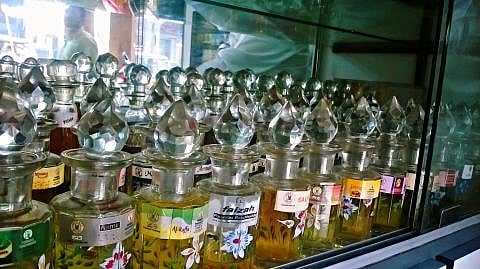

In the cluster of shops and stalls that adorn the streets around Hyderabad's iconic Charminar, Shailender Prasad's Hyderabad Perfumers stands in Pather Gatti. It is one of the few old stalls that still sell "ittar", a natural perfume oil which is derived by distilling certain flowers and organic herbs.
The art of making ittar is fading away, with the present generation of ittar sellers unsure if their progeny will keep the trade alive.
Ittar, also popularly known as "Attar" comes from the Persian word "Atr" meaning fragrance. "Ittar has a long history. It is said that Prophet Mohammed himself loved it," says Shailender.
Shailender's family has been in the business for four generations now and have been around since 1896. His forefathers were originally from Gujarat and migrated to Madhya Pradesh in the 1800s. "My great grandfather Purandas moved to Hyderabad in the 1890s and decided to set shop. The generations that followed have split up and now run multiple shops around here," he adds.
Purandas Ranchoddas is one of the other shops set up by Purandas' descendants and it has been around for a while. "We have been in this shop since 1935. We used to have one near the Mecca Masjid. That one survived the Musi flood but couldn't survive a fire accident later," says Aadinath, one of the brothers who runs the shop.
"We make our own perfumes. We have to import raw materials from Mumbai, Kolkata and sometimes even France and blend them here ourselves.The ittar can't be too strong or too weak. It has to be just right," he adds.
Aadinath also adds to Purandas' legacy "He became so successful later on that he went on to become the official ittar supplier of the Nizams in 1920. He would visit the Nizam, who would sample them and wave his hand as a signal for his men to buy it," he says while adding that they still use the same technique that Purandas used in the 1920s.
Ittar is usually offered for sale in small quantities and have traditionally been offered in decorated glass bottles. The perfumes are completely organic and have no chemicals whatsoever.
A little ahead of Purandas Ranchoddas, another neat, small ittar shop is going through its fifth generation in the business. They have been around longer than the Nizam's official supplier.
"My great grandfather used to sell ittar as a street vendor in front of the Charminar. That's how he survived the Musi flood. He picked his shop up and ran," quips Mohammed, who sits with his father Hashim, the current owner of "Nizam Attar".
"Making the ittar is a long process which may take up to 45 days. Depending on what ingredients are used, the cost may also vary. We have stuff from Rs 100 to Rs 8000, for that little bottle there," Mohammed adds.
Soon after, two teenagers enter and choose a bottle. The ittar is swiftly transferred into a small glass bottle, sealed, labelled and packaged in a tiny box, ready to be used.
"The crowd is definitely getting smaller. Not many people visit us now after deodorants got famous. People only used ittar a few generations ago," he says. The age old tradition is slowly dying with each passing generation and the fear stands that the business may not fetch enough to make ends meet.
"The base for most of the ittar's is sandalwood oil and conventionally we used to buy it off small traders and shop owners. Now we have to buy branded material which is much costlier," says Mohammed.
Some of the shops, unable to take the stiff competition from foreign and Indian perfume and deodorant companies and rising base prices, have even taken to using chemically extracted oils as a base, as they are cheaper and less labour is involved while compared to the organic oil.
"The interests of the younger generation are also changing with many people branching off into different professions. I will do it, but I don't know if my next generation will," Mohammed adds.